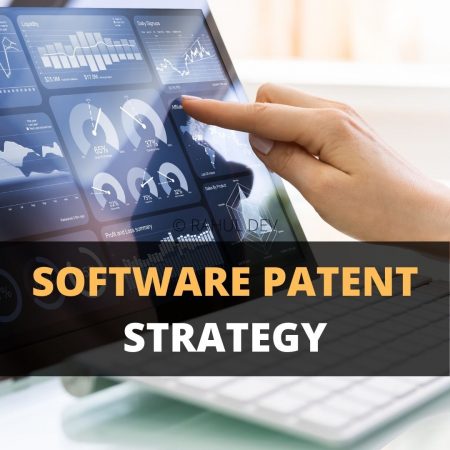Protection of Software Innovations
Explore the Process to Develop a Strong Portfolio of Software Patents

Understand Practical Aspects
Understand how to file Software Patents

Explore the Process to Develop a Strong Portfolio of Software Patents

Understand how to file Software Patents

Protect your innovations across multiple countries and create strong patent portfolio to boost business valuation
Local and global brand protection through international trademark registrations
Extensive research and business writing for technical whitepapers and B2B content products
This article is about software patent protection strategy with examples based on my experience as a software patent attorney. Ever wonder if the cool software you’re working on can be protected? Software patents are a way to keep others from copying the core functions of your innovations, even if they make something similar on their own. But, getting software patents has gotten tougher recently, even though they’re super important for protecting awesome new technology innovations.
Why should you care about software patents? They’re your best bet if you want to prevent your unique software from being copied and further multiply the valuation of your business. Patents protect your ideas and help you stay ahead of the game. Plus, they’re crucial in fields like e-commerce and AI, where being the first with a new tool can mean big wins.
But what makes software patentable anyway? Understanding software patents can be a game-changer for any developer or a business that is based on providing products and services derived from the innovative software. By knowing what can be protected, you can make sure your cool tech stays yours and keeps giving you an edge over others.
This article covers following topics:
Software Patents in AI, Blockchain, and Data Analytics
What’s Patentable About Software?
How Do I Figure Out If My Software Is Patentable?
When Do You Need a Software Patent?
What Types of Software Are Patentable?
Expanding Your Software Patent Portfolio

In a world driven by rapid technological advancements, securing your innovations with software patents isn’t just smart, it’s necessary. My journey through the complex landscape of AI, blockchain, and data analytics has revealed that without protection of software patents, groundbreaking ideas are left unprotected. Patents empower creators and inventors by safeguarding their inventions, facilitating tech transfer, and fostering further innovation. Throughout my career, I’ve navigated the intricate process of software patent searching and software patent drafting with a focus on these cutting-edge technologies. This experience has not only protected valuable intellectual property but also enabled the strategic sharing of technology across different sectors. Effective patent drafting and software technical writing are critical skills that enhance the communication of complex ideas, ensuring they are both understood and legally protected. By mastering these skills, innovators can secure their place at the forefront of technological evolution, driving growth and inspiring industry-wide advancements.
Securing software patents for AI, blockchain, and data analytics is more than a protective measure, rather it’s a strategic move in the global tech arena. My expertise and experience in patent drafting and technical writing provide a robust foundation for protecting and propagating technological innovations. Embracing this approach ensures that your innovations not only gain the recognition they deserve but also achieve the commercial success they are capable of.
In the dynamic domain of intellectual property rights, the software patent landscape has always been a topic of intense debate. Software developers often wonder if their innovative digital creations can be protected by patents. While copyright laws shield direct code replication, they do not prevent the development of functionally equivalent software by others. Conversely, software patents can provide developers the exclusive rights to the core functionality of their innovations, even if others independently develop similar functionalities. Recent years have witnessed significant shifts in the software patent process, making it increasingly challenging to obtain such protections. However, there is a growing recognition of the importance of software patents in safeguarding genuine innovations.
For software to be deemed patentable, it must exhibit a high level of technical sophistication. Simple software that uses a general-purpose computer for mundane tasks is unlikely to qualify. However, software that introduces novel memory structures, enhances computer performance, or creates innovative database architectures significantly increases its chances of being patentable. For instance, the development of a real-time translation travel companion app demonstrates the critical role of software patent strategies in protecting unique technological solutions. An example of a software patent similar to this innovation is US11244121B2, which discloses an innovation covering natural language translation and localization.
Determining the patentability of software often hinges on the strategic writing of software patent claims. It is advisable for innovators to focus on specific technological problems solved by their software and the unique solutions provided, rather than claiming broad functionalities. For example, the creation of a language exchange platform highlights the importance of defining the unique features of the software that facilitate language learning, crucial for establishing software patent eligibility.
A software patent is a legal protection that covers software programs or algorithms that are intended to be executed by computer systems. Understanding software patent criteria and software patent benefits is vital for developers looking to navigate the complexities of intellectual property rights in technology. For example, when Amazon patented its one-click purchasing system, it not only revolutionized online shopping efficiency but also secured a competitive advantage that was uniquely theirs for years. This patent exemplified how a simple, yet distinctive software solution could transform consumer behavior and set a new industry standard. To truly protect and capitalize on your software innovations, consider the broader impact of securing a software patent as part of your business strategy. Hence, it becomes essential to dive into understanding the criteria for the software patents and explore how they can benefit your projects as this knowledge could be the key to your next breakthrough in the tech industry, which becomes more profitable by filing international patents for software inventions under the PCT.
Securing a software patent is advisable when your product revolves around unique software functionality that provides a competitive edge. Copyrights protect the actual code but do not cover the underlying functional concepts of the software. In contrast, a patent protects the functional aspects, allowing holders to prevent others from using the patented technology. The software patent protection is particularly beneficial in sectors like e-commerce, demonstrated by the success of a cross-border e-commerce translation tool which leverages patent protection to secure a market advantage.
The patentability of software depends on its ability to bring about tangible technical improvements over existing technologies. Software that merely automates traditional tasks using a computer is less likely to be patentable. However, software that achieves new technical effects, such as software patent innovations in conversational AI used in financial services, is more likely to meet the stringent requirements for patents. The conversational AI case study exemplifies how advanced applications can surpass traditional software patent criteria to gain significant software patent advantages.
Software’s impact on retail can also demonstrate patentable innovation. The integration of AI for personalized shopping experiences, coupled with blockchain for secure crypto cashback systems, as detailed in the AI shopping assistance case study, illustrates how multifaceted software innovations can be protected under patent law.
Building a robust software patent portfolio involves not just securing patents for individual products but developing a comprehensive strategy that covers all aspects of the technology. For instance, in the fast-paced world of cryptocurrency and blockchain, an AI-powered trading platform and an NFT management and trading platform both represent areas where innovative use of software that goes beyond traditional applications is patentable. Navigating the software patent eligibility requires a deep understanding of both technological and legal nuances. As the software patent trends evolve, developers need to stay informed about software patent requirements and software patent validity to effectively protect their innovations in a competitive market. Understanding these dynamics can guide software developers through the complexities of software patent application and software patent litigation, ensuring robust protection for their innovations.
About the Author
Rahul Dev is a seasoned Patent and Trademark Attorney and PhD Research Scholar with profound expertise in software, SaaS, AI, ML, blockchain, and data science technologies. With over 18 years of international experience spanning Asia Pacific, the US, and Europe, Rahul has established himself as a pioneering thought leader and educator in the fields of AI, blockchain, and technology law. His career is marked by a deep commitment to enhancing business valuation through strategic patent and innovation portfolios. Rahul’s extensive experience includes not just patent protection and licensing but also mastering complex technical drafting and whitepaper writing, making him a trusted advisor in tech transactions and intellectual property strategies.
Featured in over 50 national and international publications, Rahul is a frequent speaker at global conferences and seminars, where he shares insights into technology trends, patents, and business strategies. His professional engagements reflect his ability to navigate and simplify the complexities of patent laws to safeguard and maximize technological innovations. Through his work, Rahul empowers clients by aligning patent strategies with business goals, ensuring that innovative products and services achieve competitive advantage and legal protection in the global market. Whether through educating at top-tier universities or consulting across diverse industries, his contributions continue to foster innovation and strategic growth in the high-tech landscape.

As a business coach and thought leader, I cannot emphasize enough the importance of innovation, new software patents, mobile apps, and patents for tech companies, startups, and entrepreneurs. The world is rapidly evolving, and staying ahead of the curve is vital for success. Embracing technological advancements such as blockchain and AI can unlock unprecedented opportunities, streamline operations, and propel businesses into the future with competitive valuation via intangible assets.
Click Here for AI Startup Valuation Guide.
For instance, blockchain technology can revolutionize supply chain management and secure data sharing wherein innovative business models are explained to the audience via technical whitepapers, while AI can automate and optimize decision-making processes. Mobile apps are no longer just a luxury; they have become essential tools for engaging customers and offering personalized experiences. Furthermore, securing digital innovation patents is crucial for protecting intellectual property, fostering innovation, and maintaining a competitive edge. By investing in these areas, businesses can position themselves as industry pioneers and pave the way for a prosperous future after thoroughly conducting the due diligence and reviewing the legal opinion letters, which in case of digital assets can assist in determining the tokens as utility assets or coins as utility tokens before listing the assets at an exchange.
Our team of advanced patent attorneys assists clients with patent searches, drafting patent applications, and patent (intellectual property) agreements, including licensing and non-disclosure agreements. Advocate Rahul Dev is a Patent Attorney & International Business Lawyer practicing Technology, Intellectual Property & Corporate Laws. He is reachable at rd (at) patentbusinesslawyer (dot) com & @rdpatentlawyer on Twitter.
Quoted in and contributed to 50+ national & international publications (Bloomberg, FirstPost, SwissInfo, Outlook Money, Yahoo News, Times of India, Economic Times, Business Standard, Quartz, Global Legal Post, International Bar Association, LawAsia, BioSpectrum Asia, Digital News Asia, e27, Leaders Speak, Entrepreneur India, VCCircle, AutoTech).
Regularly invited to speak at international & national platforms (conferences, TV channels, seminars, corporate trainings, government workshops) on technology, patents, business strategy, legal developments, leadership & management.
Working closely with patent attorneys along with international law firms with significant experience with lawyers in Asia Pacific providing services to clients in US and Europe. Flagship services include international patent and trademark filings, patent services in India and global patent consulting services.
Global Blockchain Lawyers (www.GlobalBlockchainLawyers.com) is a digital platform to discuss legal issues, latest technology and legal developments, and applicable laws in the dynamic field of Digital Currency, Blockchain, Bitcoin, Cryptocurrency and raising capital through the sale of tokens or coins (ICO or Initial Coin Offerings).
Blockchain ecosystem in India is evolving at a rapid pace and a proactive legal approach is required by blockchain lawyers in India to understand the complex nature of applicable laws and regulations.